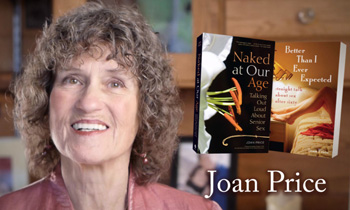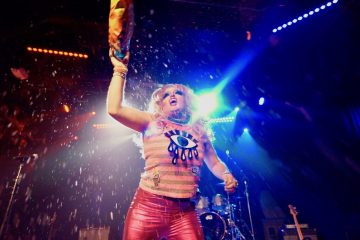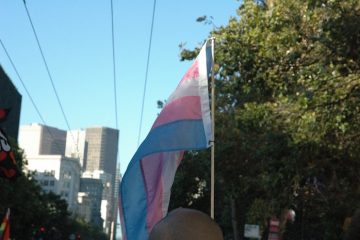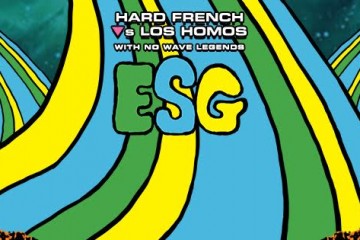Election 2011: Dennis Herrera on Dogpatch Living, 24/7 Cities, and The Freak
Well, it’s that time again. Another election year is already underway here in SF, and it already looks like it’s shaping up to be a corker. With everyone and that’s gonna be on the ballot, we thought it might help to help you get to know the contenders a little better. So, here’s the BAS 20 Questions With the Candidates 2011!
First, up is……
Name: Dennis Herrera
Age: 48
Occupation: San Francisco City Attorney
Hometown: Glen Cove, New York
Running for: Mayor
(I catch up with Dennis after he invites me up to campaign right in the heart of Polk Street)
Stephen Torres: Hey Dennis! Welcome to BAS Meet the Candidates! So, how long you lived in the city and where’s your hood?
Dennis Herrera: I’ve been for about 25 years and for 18 years I have lived in the sunny, sunny Dogpatch neighbourhood, which is much more chic an hip than when I moved in there, but there’s not many places where you can have the Hell’s Angels and a top 100 restaurant and a world-renowned ice cream parlour all within half a block of my house.
ST: What are the best/ worst aspects about living there?
DH: (laughs) The best is what I just said- it really is incredible! I mean you know, you have a shipyard with over a hundred years of history, you have soul food, top 100 restaurant, the Hell’s Angels, a great neighbourhood bar… the diversity of the place is unbelievable…you can walk to the ball park! The worst thing is… it is very difficult to get a taxi cab. Despite the fact that a lot of taxi cab yards are on the back side of Potrero!
ST: How do you get to work- Foot, bike, public transit or car?
DH: I would say three out of the four above. Although I ride my bike, I’ve never ridden my bike to work except for Bike to Work Day. But I’ve walked to work, I’ve taken transit to work, and I’ve taken my car.
ST: That is kind of a walk.
DH: Yeah, about twenty minutes.
ST: Muni. Is. Awful. Garage or salvage yard?
DH: (laughs) It is fixable, but we gotta make sure it’s better than life support. It’s gotta really be functional for everybody and right now public confidence is at an all-time low. I would say, it’s “Garage,” but we gotta make sure the lights are on.
ST: If we elect you is there anything you can really do to help get a more dependable overnight transit, BART or otherwise?
DH: I mean, I think we need to have that! And that sorta focuses on regionalism…We need a regional approach to a lot of our transit. In either New York or elsewhere there is much more of a regional cooperative. Take the Port Authority of New York, the Metropolitan Transit Agency- it’s regional. I think if we look at this and look at the areas and integrate the whole of the Bay Area we can get a lot more focus on that kind of stuff. We need transit running later than it is now. Let, me tell you, I’ve fallen asleep on that train, coming from Berkeley, missing my last stop and ending up in Daly City on BART. AND having not been able to get another train back. Yeah, it’s not a good thing trying to get the last train at midnight.
ST: It’s pretty hard to make it as a “ broke-ass” in this town, let alone find a place to live. Do you think insane rents, requirements like making several times your rent or having a certain credit score to qualify for an apartment make living here feasible?
DH: I mean, it’s difficult. There was just an article in the paper the other day about rents are rising again. And I think it makes it really, really difficult for a young person here, or not just a young person that’s trying to make it. For seniors, for those that are low to middle income….I understand that folks need to make a buck, but you don’t to over-layer everything with bureaucracy and regs to discourage folks from going out and trying to find an affordable place to live. If we want to San Francisco to continue to be unique and creative we need to make it easier for folks…especially in an environment where great cities of the world are going to be 24/7 creative centers, and that means the ability to attract a diverse population and young people as well. We can’t make it difficult for them if we want to be a model for the twenty-first century American city.
ST: Let’s say the house part doesn’t quite work. When you’re homeless in this town, do you think you really ever can bounce back?
DH: I think that if you don’t believe you can bounce back, and you lose all hope, then, you know what, I think our society is in a lot worse shape than it is. i believe, that we, as a community and as individuals need to believe and that we need to put that that belief into practice. We need to show that a city cares about its most vulnerable in terms of putting city money and services on payroll to help those that are down on their luck. Especially in an environment where, you know, you look at those that are underemployed, marginally employed in a difficult economic environment where things are only getting more challenging by the day- if you accept that it’s okay to kick people aside- then you know, that’s not a society I want to live in and we need to be very careful.
ST: A lot of the homeless are queer kids that come here with pretty much nothing. There isn’t even a hostel in the Castro. Groups like Dimensions, Lyric, etc. do what they can, but they are working on shoestrings. Is Castro Street or even the city itself capable of being not only a beacon, but also a sanctuary?
DH: I think we have to be. That what San Francisco has always been. It hasn’t just been an ideal. It really has to live up to.. the folks that come here and it attracts. We have the services and commitment to back it up. It can’t just be a dream, it has to be followed through on. And I think that, actually, city government and the non-profit world have done a pretty good job at trying to live up to the promise of trying to be what San Francisco has always been about. I think that is something that we, as a city, have to maintain and put our money where are mouth is and a shared community commitment to take care of folks that come here for that ideal that is San Francisco.
ST: One group that hasn’t had any housing problems would be bedbugs. Does the city have a contingency plan on this one?
DH: Ha! You know, it’s very interesting, bedbugs are a huge issue nationwide. They really are. I mean, when I go into a hotel now, I’m always checking for bedbugs.
ST: I’m super paranoid!
DH: I am too! If you look at District 6, the Tenderloin, that’s something we’ve been working at. Supervisor Kim has really made this an issue and some of the housing cooperatives have been working with the DPH to make sure we’re doing what we can, but it’s certainly on the radar screen.
ST: Like a lot of people in town, I have Healthy SF. Mostly okay, but some people are waiting up to a year to get really important screenings, tests, etc. One nurse told me you can try to speed things up by going to the emergency room. Universal healthcare is a critical asset in this town, no doubt, but should we be worried about the future?
DH: I don’t think you should be worried about the future, but that doesn’t mean everything is perfect. I was proud to work with then-Supervisor Ammiano and Mayor Newsom to craft it and I defended it all the way to the United States Supreme Court and then we had quality healthcare access that 50,000 San Franciscans didn’t have before. And the whole reason that we came up with the model and..was to stop people from going to the emergency room. If you think about it, that costs the taxpayer a hell of a lot more to go there as a healthcare provider of the last resort- San Francisco General Hospital- the taxpayer is paying for it. So the whole goal was to have a community based care, having that done so people didn’t end up in the emergency room. And whereas I think it’s been tremendously successful and people have benefited, we need to make sure that people aren’t waiting a year for screenings. In the light of the bedbug question, we gotta work all the bugs out of the system. To make sure we have a system that is being efficiently run and the resources are being dedicated so people don’t revert to going to General Hospital because the system can’t effectively deal with it’s clientele. So while I don’t think we should be worried about it, we have to make sure it continues to be a priority so it works well for its customers.
ST: Speaking of healing- How long do you think before it’s possible to smoke a joint without having some kind of illness?
DH: Well, (laughs) I think you need to talk to two people. The voters of California, but more importantly the Congress of the United States to see when they’re gonna be willing to change federal law and federal policy and they enforce federal law. So, for right now, have that medical card.
ST: These 7×7 miles seem to be getting a lot more square with every year that passes. Other cities seem to have more of a handle on things like street fairs and nightlife. Is the fun in the city destined to go the way of, say, the Eagle?
DH: I certainly hope not! And let me tell you- I have fond memories of the Eagle. When I first ran for office in 2001, one of the great pleasures…you show up on a Sunday afternoon beer blast at the Eagle as a candidate and you get up on stage to say a few words.. and it’s 500 guys and you got to say your piece. I believe nightlife is incredibly important to San Francisco. We need to maintain creativity and that’s why I proposed a entertainment district South of Market and why I have actively worked with nightclub owners and the entertainment industry- the vast majority of whom play by the rules- I work with them to make sure they are not getting hassled by the ABC and the ABC is not being unreasonable and we’re trying to be as friendly as we can here in San Francisco to help the business owners provide entertainment and nightlife opportunities for San Franciscans. I go out all the time- I love going out. And I think if you’re going to be that 24/7 kinda city, you better have a hell of a lot more activity then what’s going on here right now. I think people want be in creative cities. Someone that is working hard want to play hard. And you can’ttell me that you can’t strike that balance in a major city between work, creativity, and protected neighbourhoods. I believe you can.
ST: Diversity seems important to San Franciscans, but is it also endangered? Folks seem both pissed and scared. Has this “ Girl of the Golden West” forgotten who her people are?
DH: By diversity, I take it you mean across the board- socioeconomic, etc. That’s something we always have to be aware of. When you look at the fact that the African-American population has fallen from 11% to 4% in the past ten years, when you look at that middle class Latino folks can’t afford to be in the Mission anymore, when you look a the fact that industrial workers aren’t her in the degree that they were- I mean, I think that’s something we gotta always be aware of. We also are a place of great opportunity. We got a tech sector and young people are flocking here to find there economic dream..here in San Francisco instead of just down on the peninsula, that’s great, but it can’t be at the expense of other communities. We need to make sure that we are providing broad-based economic opportunity for all folks across different socioeconomic levels an that we maintain the racial and ethnic diversity in San Francisco. That’s what makes it a beautiful place and we can’t..I don’t ever want to be in a place that is just homogenized even though it might be a physically beautiful place. I want to maintain all the beauty in San Francisco and diversity is a big part of it.
ST: Who’s your local hero?
DH: My local hero…..other than my wife and my son? I would have to say Tim Lincecum. I’m a huge baseball fan and I know a lot of people like Brian Wilson and “The Beard,” but the “The Freak” does it for me. I love the way this 5’10” goes out and dominates players and does it in a cool, quiet way.
ST: Every American city has deep-seeded, local subjects of debate, where one has to take a side. What is your stance on the following: What is the best a) coffee; b) ice cream; c) cioppino; d) burrito; e) dim sum?
DH: Okay. I would say this: Piccino in my neighbourhood serves the best coffee. And I will tell you that they have historically done Blue Bottle- and I love Blue Bottle- but they just changed to a more….I think it’s not as strong, but it’s a bit more florally aromatic blend of coffee which is just as goos, but different. But I love Piccino.
Mr. and Mrs. Miscellaneous- best ice cream in my neighbourhood. Right there on the corner of 22nd and 3rd. Run by a little family, and they just serve ice cream ‘til they run out. It’s really good. But they aren’t open all the time, but it’s great! And they were ranked, I think it was number two in the city.
Um, I will say La Taqueria for burrito.
And for dim sum….City View.
ST: Cioppino?
DH: Cioppino….Caesar’s! Down on Bay and Stockton.
ST: What’s your favourite cheap bar? Your poison?
DH: I’m an Irish whiskey drinker first, and scotch drinker second. So Jameson on the rocks with a twist, or scotch. And..the Dogpatch Saloon I love. I, also, years ago, used to..blanking now, 17th and Folsom..the Rite Spot! I love the Rite Spot, have a lot of history in the Rite Spot…a lot of history. Yeah, the Dogpatch Saloon and the Rite Spot. (Laughs as a passing campaigner also gives the Rite Spot the seal of approval.)
ST: What’s your favourite cheap grub spot?
DH: Cheap grub spot….cheap grub…Kitchenette? Kitchenette, it’s on the backside of Illinois Street.
ST: Yeah! On the loading dock. That place is supposed to be good! What’s important in San Francisco right now?
DH: I think…to be able to adapt. To celebrate our past, but to recognize that we have a lot of challenges and a lot of opportunities and I think we’ll make the right choices. You know, if you look at the phoenix- it is one of the symbols of San Francisco because we always rise, right? From the ashes and we have the unique ability to re-invent ourselves. And I think we are in one of those periods right now where we have to adapt, celebrate our past and prepare for what’s going on domestically and in the world…to be a model for a what a twenty-first century American city needs to be. And the choices we make right now are going to dictate what we’re going to be like fifty, seventy-five years from now. Are we going to maintain and celebrate diversity? Are we going to be an international gateway city? Right now we’re at one of those places where we need to be able to adapt.
ST: That kinda answers the next question which is…why is San Francisco important right now?
DH: Yeah basically what I just said. I think there are very few cities in the United States that have that ability to adapt and be international gateway cities. You know, whereas, before we were competing with L.A. and New York, whatever. Think about it- right now, even though we have a lot of big cities, not a lot of cities are positioned to be gateway cities internationally. New York..certainly. San Francisco is too. Because of our geographic location on the cusp of the Pacific rim, educated work force, density, history of celebrating entrepreneurship and creativity, and appreciating diversity….I think we have our physical beauty. These things uniquely position us. even compared to other cities that are big….what is happening here is San Francisco can be advanced in terms of its presence in the world.
ST: People like to sing about this place a lot. Perfect San Francisco song?
DH: We were talking about this..and how they’ve been using “Don’t Stop Believing” for the Giants…and that’s pretty good, but I dunno, for me, Train’s “ Drop’s of Jupiter” to me is always a San Francisco song. I have such fond memories of it because when I first ran in 2001 and no one thought I was going to win, that song was on all the time and I’d be driving around the city and thinking about my campaign..and it was just very inspiring to me and I think that’s what San Francisco is all about. I like Train’s music in general and that song really sticks with me.
Thanks for answering our answering our 20 questions, Dennis! And thanks to the amazing Melissa Blaustein for all her help! Good luck in November, guys!







